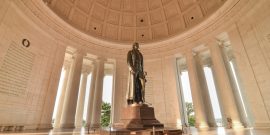The powers of government to superintend civil society can sometimes be valid, but they should have clear, jealously guarded limits.
Richard W. Garnett
Antidiscrimination law can take on a different aim when it reaches into social, personal, and private life.
The unanimous opinion in Groff v. DeJoy clears the way for the Civil Rights Act to accomplish one of its important, but long hamstrung, purposes.
American higher education needs institutional pluralism.
Christianity's dualistic claim is uniquely suited to provide the limits sought by liberalism and constitutionalism.
Justice Rehnquist's dissent provides a possible roadmap for the Supreme Court in Dobbs v. Jackson Women’s Health Organization.
American religious freedom has respected the rights of citizens to live integrated lives and to carry their commitments with them in civil society.
Wednesday’s ruling was a significant and welcome re-affirmation of a principle that, we should hope, is firmly entrenched in American constitutional law.
The abuses and crimes of Catholic bishops and priests casts doubt on the "freedom of the church."
Richard W. Garnett is Paul J. Schierl / Fort Howard Corporation Professor of Law at the University of Notre Dame.









